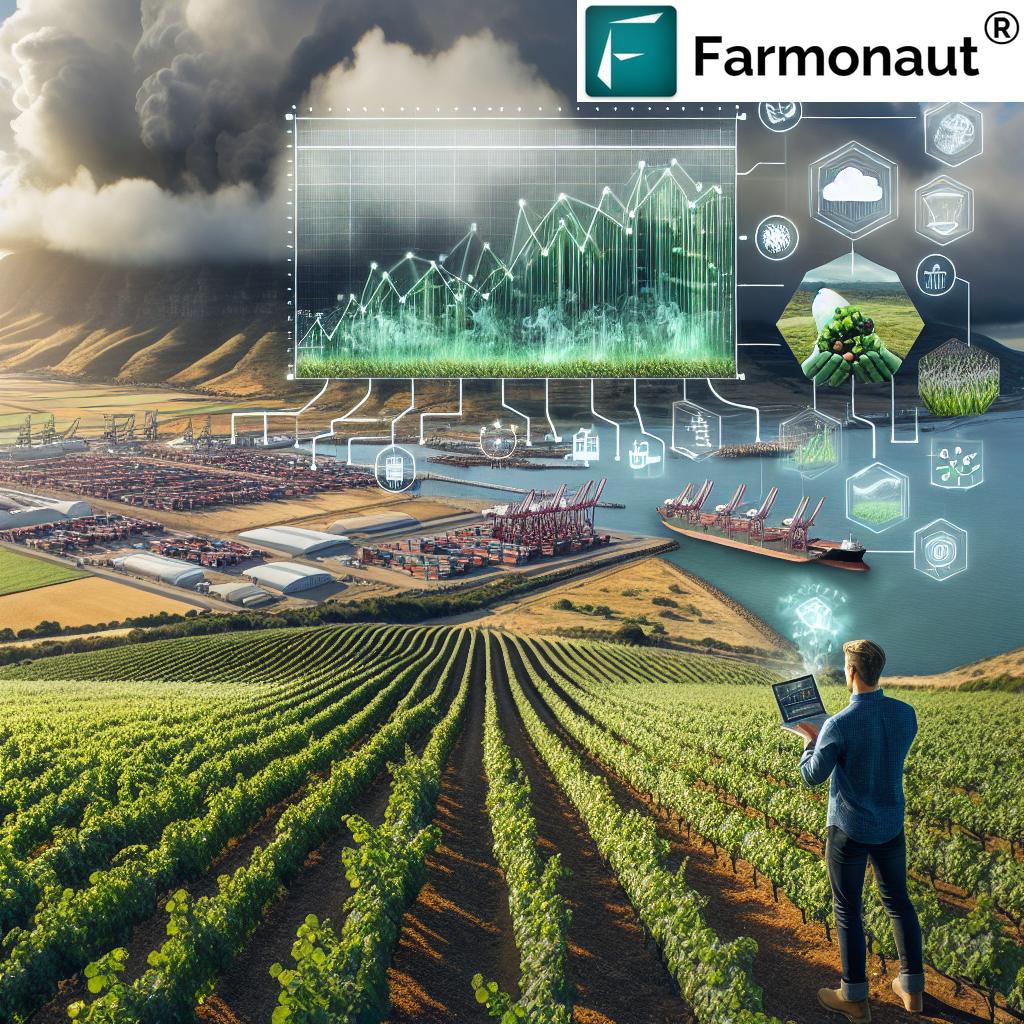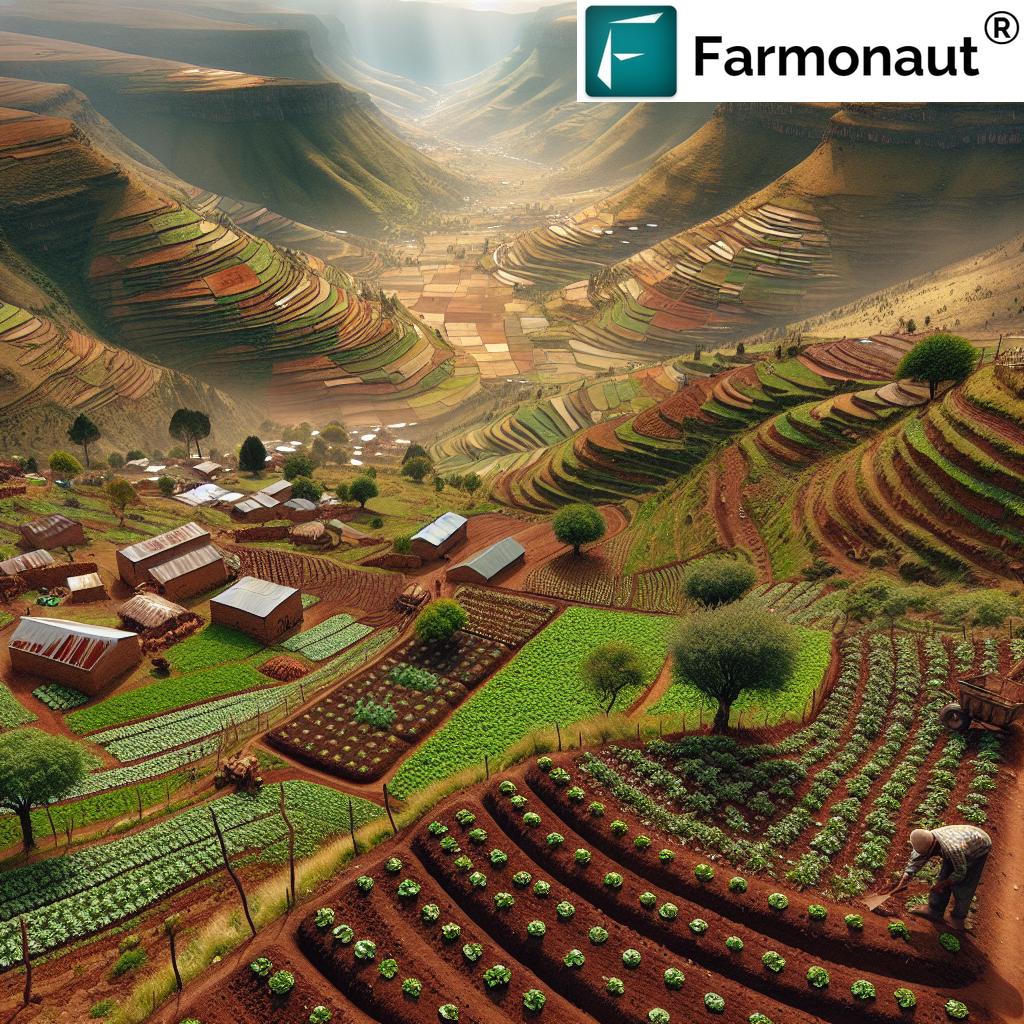South African Agriculture 2024: Navigating Challenges and Embracing Resilience in an Election Year
“South African agricultural exports reached $10.2 billion in just nine months of 2023, showcasing the sector’s resilience.”
As we delve into the landscape of South African agriculture in 2024, we find ourselves at a critical juncture. The sector faces a myriad of challenges, yet continues to demonstrate remarkable resilience and adaptability. In this comprehensive analysis, we’ll explore the complexities of the agricultural industry in South Africa, examining the hurdles it faces, the opportunities that lie ahead, and the innovative strategies being employed to ensure its continued success.
The Current State of South African Agriculture
South Africa’s agricultural sector stands as a cornerstone of the nation’s economy, contributing significantly to food security, employment, and export revenues. As we navigate through 2024, the industry finds itself at a crossroads, grappling with both longstanding issues and emerging challenges.
- Rising Input Costs: Farmers across the country are feeling the pinch of escalating prices for essential inputs such as fertilizers, fuel, and pesticides.
- Energy Crisis: The ongoing electricity shortages continue to pose significant operational challenges for farms and agribusinesses.
- Logistical Bottlenecks: Inefficiencies at ports and transportation networks are hindering the smooth flow of agricultural exports.
- Climate Variability: Unpredictable weather patterns, including the looming threat of El Niño, are causing concern among farmers.
Despite these hurdles, the South African agricultural sector has shown incredible resilience. The export figures for the first nine months of 2023, reaching an impressive $10.2 billion, serve as a testament to the industry’s robustness and ability to adapt to adverse conditions.

Embracing Regenerative Farming Techniques
In response to the mounting challenges, many South African farmers are turning to regenerative farming techniques. This approach focuses on enhancing soil health, improving water retention, and increasing biodiversity. By adopting these practices, farmers are not only boosting their yields but also contributing to long-term environmental sustainability.
Some key regenerative farming strategies gaining traction include:
- Cover cropping to protect and enrich soil
- Minimal tillage to preserve soil structure
- Crop rotation to enhance soil fertility and break pest cycles
- Integration of livestock grazing to improve nutrient cycling
These techniques are proving to be effective agricultural resilience strategies, helping farmers to better withstand the impacts of climate variability and reduce dependence on expensive inputs.
The Citrus Success Story
One of the brightest spots in South Africa’s agricultural landscape has been the citrus industry. Despite the challenges faced by the sector as a whole, citrus exports have set new records. This success can be attributed to several factors:
- Favorable weather conditions in key growing regions
- Strong international demand for South African citrus
- Improved variety selection and orchard management practices
- Effective marketing strategies in international markets
The citrus industry’s achievements underscore the potential for growth and success within South African agriculture, even in the face of adversity.
Horticulture: A Sector on the Rise
The horticulture sector, encompassing a wide range of fruits and vegetables, has also shown promising growth. Favorable weather patterns have contributed to increased yields and quality for crops such as tomatoes, apples, and avocados. However, the sector is not without its challenges:
- Fluctuating market prices due to supply variations
- Increased competition in export markets
- The need for ongoing investment in cold chain infrastructure
Despite these hurdles, the horticulture sector continues to be a significant contributor to South Africa’s agricultural exports and domestic food security.
Livestock Industry: Resilience Amidst Challenges
South Africa’s livestock industry, encompassing cattle, sheep, and poultry, plays a crucial role in the agricultural sector. However, it has faced significant challenges in recent years:
- Avian Influenza: Outbreaks have severely impacted poultry production
- Drought Conditions: Affecting grazing lands and increasing feed costs
- Disease Control: Ongoing efforts to maintain foot-and-mouth disease-free status
Despite these challenges, the livestock industry has shown remarkable resilience. Farmers are adopting innovative practices, such as rotational grazing and improved breeding programs, to enhance productivity and sustainability.
“Despite challenges, South Africa’s citrus industry set export records in 2023, benefiting from favorable weather patterns.”
The Impact of the Energy Crisis on Agriculture
The ongoing energy crisis in South Africa continues to be a significant concern for the agricultural sector. Load shedding and unreliable electricity supply have far-reaching consequences:
- Disruption of irrigation systems, affecting crop yields
- Challenges in cold storage and processing of perishable goods
- Increased operational costs due to reliance on diesel generators
To address these issues, many farmers and agribusinesses are investing in alternative energy solutions, such as solar power and biogas systems. While these investments represent additional costs in the short term, they are crucial for long-term sustainability and resilience.

Logistical Challenges and Export Performance
Despite the impressive export figures, South Africa’s agricultural sector continues to grapple with significant logistical challenges. The efficiency of ports and transportation networks plays a crucial role in the country’s ability to capitalize on export opportunities. Key issues include:
- Congestion and delays at major ports
- Inadequate rail infrastructure for transporting agricultural goods
- Rising transportation costs affecting competitiveness
Addressing these logistical bottlenecks is crucial for maintaining and expanding South Africa’s position in global agricultural markets. Government and private sector initiatives are underway to improve port efficiency and upgrade transportation infrastructure.
The Role of Technology in South African Agriculture
In the face of these challenges, technology is playing an increasingly important role in South African agriculture. Precision farming techniques, enabled by satellite imagery and data analytics, are helping farmers optimize resource use and improve yields. Farmonaut, a leading agricultural technology company, is at the forefront of this digital revolution in farming.
Farmonaut’s satellite-based farm management solutions offer South African farmers valuable tools for:
- Real-time crop health monitoring
- Efficient resource management
- Weather forecasting and risk assessment
- AI-powered advisory services
By leveraging these technologies, farmers can make more informed decisions, reduce input costs, and improve overall farm productivity.
The Political Landscape and Its Impact on Agriculture
As South Africa approaches national elections in 2024, the political landscape adds another layer of complexity to the agricultural sector. Key considerations include:
- Potential changes in agricultural policies and support programs
- Land reform debates and their implications for farm ownership
- Trade agreements and their impact on agricultural exports
The uncertainty surrounding these issues underscores the need for resilience and adaptability within the agricultural sector. Farmers and agribusinesses are closely monitoring political developments and preparing for various scenarios.
Sustainable Farming Practices: A Path Forward
As South Africa’s agricultural sector navigates these challenges, there is a growing emphasis on sustainable farming practices. This shift is driven by both environmental concerns and the need for long-term economic viability. Key areas of focus include:
- Water conservation and efficient irrigation systems
- Integrated pest management to reduce reliance on chemical pesticides
- Soil health management through organic practices
- Biodiversity conservation and ecosystem services
These sustainable farming practices not only help to address environmental concerns but also contribute to the resilience of farms in the face of climate variability and market fluctuations.
The Impact of El Niño on South African Agriculture
The potential impact of El Niño on South African agriculture in 2024 is a significant concern. This weather phenomenon is typically associated with drier conditions in Southern Africa, which could have far-reaching consequences for the agricultural sector:
- Reduced rainfall affecting rainfed crops
- Increased pressure on water resources for irrigation
- Potential changes in pest and disease patterns
- Impacts on livestock due to reduced grazing and water availability
Farmers and agricultural stakeholders are closely monitoring weather forecasts and implementing strategies to mitigate the potential impacts of El Niño. This includes diversifying crop selections, investing in water-efficient irrigation systems, and exploring drought-resistant crop varieties.
The Role of Farmonaut in South African Agriculture
In this challenging agricultural landscape, Farmonaut’s technology plays a crucial role in helping South African farmers optimize their operations. By providing real-time satellite imagery and AI-powered insights, Farmonaut enables farmers to:
- Monitor crop health and detect issues early
- Optimize irrigation and resource use
- Make data-driven decisions on planting and harvesting
- Assess and mitigate weather-related risks
These capabilities are particularly valuable in the context of South Africa’s variable climate and the need for efficient resource management. Farmonaut’s technology empowers farmers to adapt to changing conditions and maintain productivity in the face of challenges.
Access Farmonaut’s innovative solutions:
South African Agriculture Sector Overview 2024
| Sector/Aspect | Challenges | Opportunities | Farmonaut’s Role |
|---|---|---|---|
| Citrus | Logistical issues, export regulations | Record exports, strong international demand | Crop health monitoring, yield prediction |
| Horticulture | Market price fluctuations, cold chain infrastructure | Favorable weather, export growth | Resource management, weather forecasting |
| Livestock | Disease outbreaks, drought impacts | Improved breeding programs, rotational grazing | Pasture health monitoring, grazing management |
| Regenerative Farming | Initial implementation costs, knowledge gaps | Improved soil health, reduced input costs | Soil health analysis, practice effectiveness tracking |
| Export Performance | Port inefficiencies, global competition | Growing international markets, diversification | Production forecasting, quality assessment |
Looking Ahead: The Future of South African Agriculture
As we look towards the future of South African agriculture, several key trends and focus areas emerge:
- Climate-Smart Agriculture: Increasing adoption of practices that enhance resilience to climate variability
- Digitalization: Greater integration of digital technologies in farming operations
- Value Chain Integration: Strengthening links between farmers, processors, and markets
- Export Market Diversification: Exploring new international markets to reduce dependency on traditional export destinations
- Skills Development: Investing in training and education to build a skilled agricultural workforce
These focus areas will be crucial in shaping the future of South African agriculture, enhancing its competitiveness, and ensuring its long-term sustainability.
Conclusion: Resilience in the Face of Adversity
As we navigate through 2024, South African agriculture stands at a critical juncture. The sector faces significant challenges, from rising input costs and energy crises to logistical bottlenecks and climate variability. However, the industry’s resilience, as evidenced by strong export performance and innovative adaptations, provides reason for optimism.
The adoption of regenerative farming techniques, the success of the citrus industry, and the growing emphasis on sustainable practices all point to a sector that is actively evolving to meet current challenges. The role of technology, exemplified by companies like Farmonaut, will be crucial in driving this evolution and enhancing the sector’s resilience.
As South Africa approaches national elections, the agricultural sector must remain adaptable and forward-thinking. By embracing innovation, sustainability, and resilience, South African agriculture can continue to play a vital role in the nation’s economy and food security, while also contributing to global agricultural markets.
The path ahead may be challenging, but the South African agricultural sector has repeatedly demonstrated its ability to overcome adversity. With continued innovation, strategic planning, and supportive policies, the sector is well-positioned to navigate the complexities of 2024 and beyond, emerging stronger and more resilient.
FAQ Section
Q: How is the energy crisis affecting South African agriculture?
A: The energy crisis, characterized by frequent load shedding, is disrupting irrigation systems, cold storage facilities, and processing operations. This leads to increased operational costs and potential crop losses. Many farmers are investing in alternative energy solutions like solar power to mitigate these impacts.
Q: What role does technology play in South African agriculture?
A: Technology, particularly precision farming techniques enabled by companies like Farmonaut, is playing an increasingly important role. It helps farmers monitor crop health, optimize resource use, predict weather patterns, and make data-driven decisions, ultimately improving productivity and sustainability.
Q: How is South African agriculture preparing for potential El Niño impacts?
A: Farmers are implementing various strategies, including diversifying crop selections, investing in water-efficient irrigation systems, and exploring drought-resistant crop varieties. They are also closely monitoring weather forecasts and utilizing technologies for early detection of potential issues.
Q: What are the main challenges facing South African agriculture in 2024?
A: Key challenges include rising input costs, energy crises, logistical bottlenecks, climate variability, and political uncertainty related to upcoming elections. The potential impact of El Niño is also a significant concern.
Q: How is the South African citrus industry performing?
A: The citrus industry has been a bright spot, setting export records despite challenges. This success is attributed to favorable weather conditions, strong international demand, improved variety selection, and effective marketing strategies.














